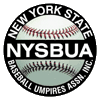The NFHS Baseball Rules Committee and the NFHS Board of Directors believes there are areas of the game of interscholastic baseball that need to be addressed and given special attention. These areas of concern are often cyclical, some areas need more attention than others, and that is why they might appear in the rules book for consecutive editions. These concerns are identified as “Points of Emphasis.” For the 2019 high school baseball season, attention is being called to: Sportsmanship, Compliance of Player’s Equipment and Baserunner’s Responsibilities. When a topic is included in the Points of Emphasis, these topics are important enough to reinforce throughout the academic year because they are not being given the proper attention.
SPORTSMANSHIP
National Anthem Standoff
The standing and singing of the national anthem is a valued tradition that is held prior to sporting events. Staring down an opponent after the national anthem, trying to intimidate them or refusing to leave the respective baseline before the other team departs is not consistent with the mission of education-based athletics. Coaches are the closest role models to these students and are held accountable for the behavior of their players as they represent their school and community. If those actions are not representative of high school sports and what they stand for, then corrective measures should take place.
Bench Jockeying, Celebrations and Negative Comments Between Opponents
Coaches, players, substitutes, attendants or other bench personnel shall not leave the dugout during live ball for any unauthorized purpose. Coaches or team personnel may not sit outside the dugout/bench on buckets or stools. Players are not allowed to stand or kneel outside their dugout/bench and make “cat-calls” or any other disparaging remarks while the other team is taking infield practice. Rooting for your team is an integral part of high school baseball. However, making disparaging remarks toward your opponent does not improve the game; in fact it detracts from the contest. The purpose of interscholastic sports is educational. Chants/intentional distractions/loud noises (natural or artificial) directed at the opponent’s pitcher prior to his pitching, or the batter getting ready to hit, or a fielder getting ready to make a play is not good sportsmanship. We should strive to have our young people play to the best of their ability and let their natural talent be the barometer of their success.
This is unsportsmanlike behavior and shall not be tolerated in interscholastic baseball. Umpires and coaches need to work together for the benefit of the students they officiate and teach. It is these game situations that provide coaches and umpires excellent “teachable moments” to reinforce proper behavior and perspective. The positive values that are learned at the baseball diamond will serve the young people long after their high school careers have ended.
Enforcement of NFHS Jewelry Rule
Items that are attached except medical appliances/devices are considered to be jewelry. The primary cause for the restriction of jewelry is primary for risk minimization for the wearer and for the opponent. Earrings and various other piercings can be problematic for a player if the piercing gets caught on equipment and torn away from the body. Obviously, if a physician has provided documentation in support of a particular piercing, the local state association has the latitude (with proper justification) to make a special accommodation for the player. We need to be more vigilant to protect our players and their opponents.
COMPLIANCE OF PLAYER'S EQUIPMENT
In preparation of the new equipment that will have the NOCSAE stamp being introduced into high school baseball, it is appropriate to begin to have those discussions with players, coaches, umpires and parents. The NOCSAE stamped baseball will be available for use during the 2019 high school baseball season. The transition will be easier when all the baseballs have both the NFHS Authenticating Mark and NOCSAE seal effective January 1, 2020, but in the interim, balls that have the NFHS Authenticating Mark are permissible for use this season.
It is critical that coaches understand their responsibility regarding being knowledgeable about the equipment that their players possess and use for game competition. The NOCSAE standard for body/chest protectors is an important piece of equipment that is designed to protect the heart and cardiac cavity and reduce the risk of commotio cordis. All high school catchers will have to have new body/chest protectors beginning January 1, 2020. When a coach is asked to verify that his players are properly equipped in accordance with NFHS rules, he/she shall also verify that the participants are using only legal equipment, including bats that are unaltered from the manufacturer’s original design, production and meet the provisions of Rule 1-3-2 and helmets that meet the provisions of Rule 1-5-1 and are free of cracks and damage.
BASERUNNERS' RESPONSIBILITIES
The baserunner is arguably one of the most important roles in baseball. Without him/her there can be no scoring. However, the baserunner has tremendous responsibilities. Beside Definitions, Baserunning is the second largest rule in the NFHS Rule book. The Baseball Rules Committee wants to emphasize that the advancing baserunner has to touch the bases in the correct order (including awarded bases), he/she should not miss any base or leave a base too early, but if that occurs, he/she must return to touch the base immediately. In addition, the committee wants to point out that if the baserunner runs more than three feet away from a direct line between bases to avoid a tag or to hinder the defensive player he/she will be declared out. They must slide in a direct line between the bases. When he/she elects to slide (by rule he/she does not have to slide) it must be legal. The baserunner cannot cause illegal contact and/or illegally alter the actions of the defensive player in the immediate act of making a play or on a force play. Jumping, hurdling and leaping are all legal attempts to avoid the fielder as long as the fielder is lying on the ground. Diving over a fielder is illegal. Attention to the intricacies of base running will enhance better rule knowledge and compliance, elevate fair play and promote risk minimization.

